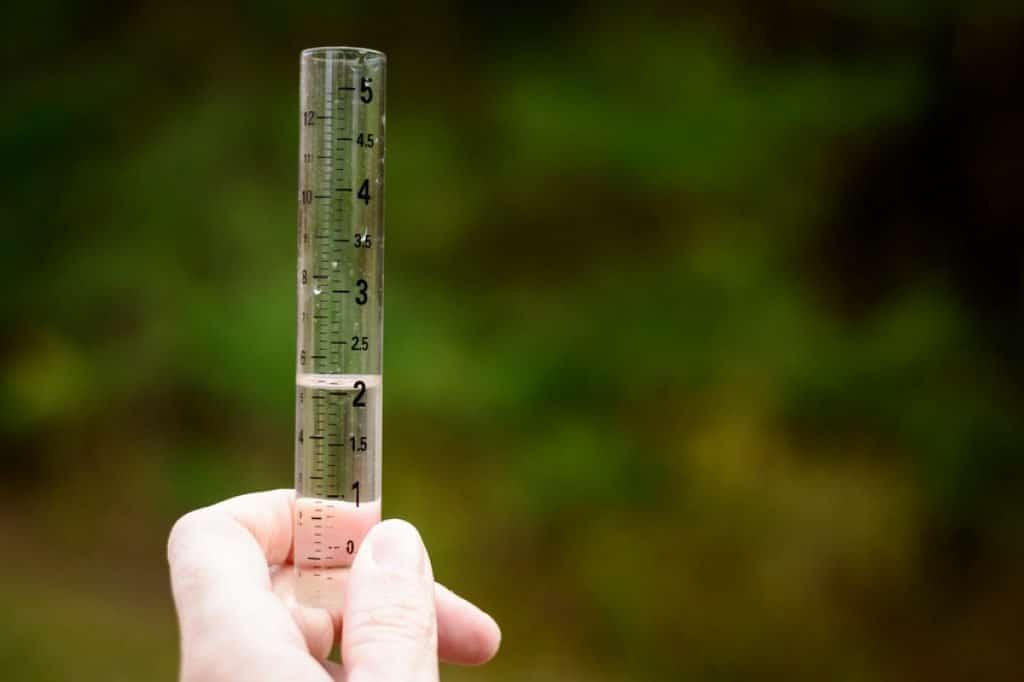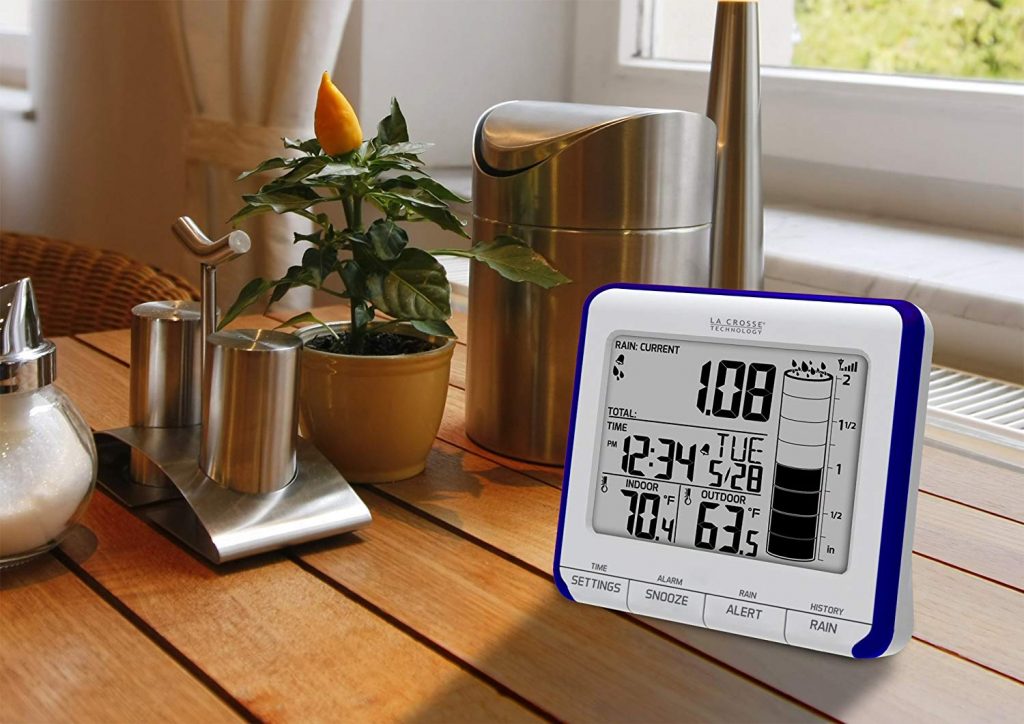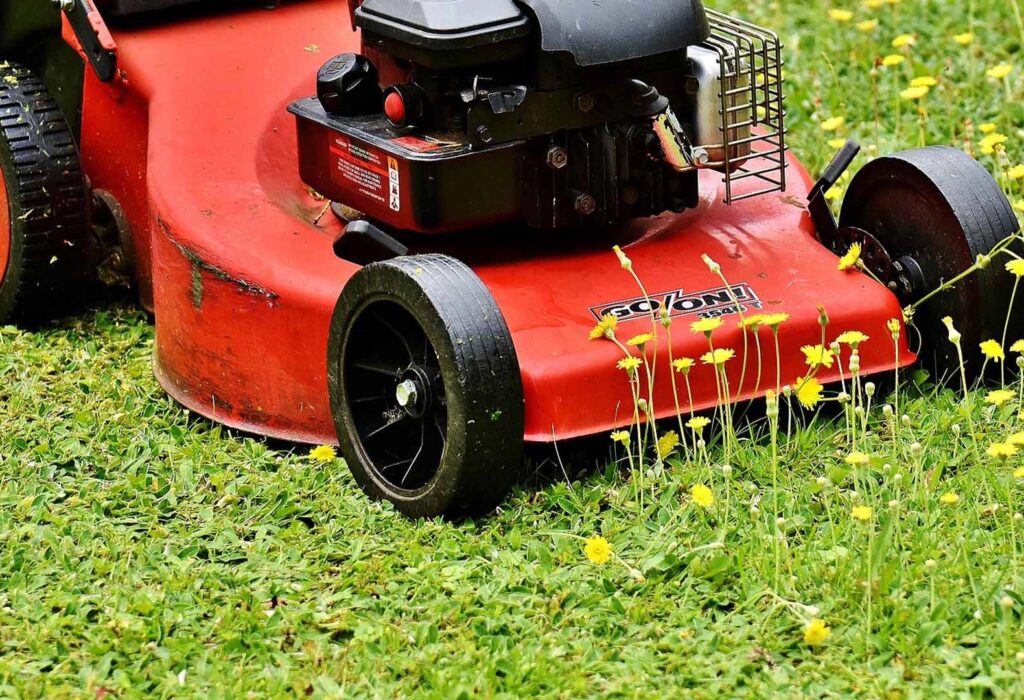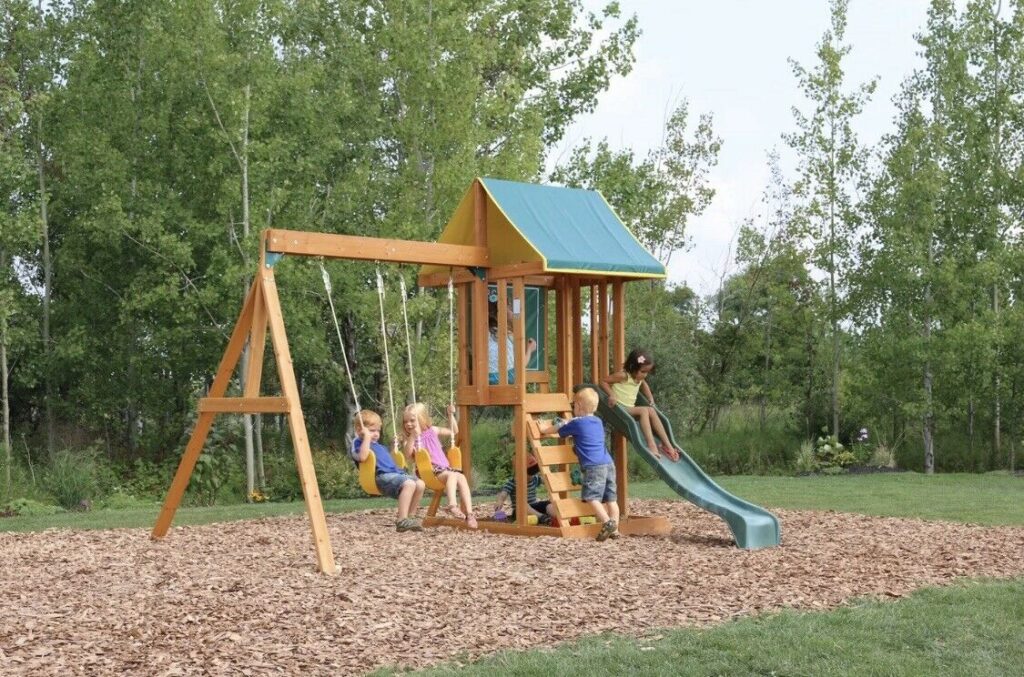Whether you’re improving your garden or planning yardwork that requires dry land, a rain gauge is a simple and effective tool that will come in handy. Many rely on them, from farmers who use them to monitor draughts, to meteorologists, to disaster readiness groups. Finding the best rain gauge on the market today, however, is challenging, as new and often better products arrive consistently.
With so many rain gauges flooding the market, determining your needs is critical. Accuracy is important, but hobbyists will need less precision than a farmer. Measurement capacity may not be a concern for those in drier regions, but if in an area with lots of rainfall, you will want a large capacity. Lastly, consider key design functions: how easy it is to install, its durability, and whether it resists the collection of debris.
Since you’ll have to take into account many features to make an informed buying decision, our in-detail reviews will help you determine the best rain gauge available today for your specific needs. We put these gauges to the test and considered the needs of consumers from many backgrounds to determine which is easy to use, can withstand the elements, and is the most accurate. Our buying guide concludes on the best rain gauge on the market today at the end of the article which is the Stratus Precision Rain Gauge. We’ve also laid out key features of each gauge in a handy table so you can make an informed decision on the best rain gauge for you at a quick glance.
More features: 1/100-inch accuracy, US Weather Bureau standards-compliant, UV resistant
The Stratus Precision Rain Gauge is an instrument with professional accuracy, durability, and ease of use to accommodate an amateur.
The Precision Rain Gauge is true to its name, accurate to 1/100th of an inch, exceeding US Weather Bureau standards. And you can take the US government’s word for it, too – this is the gauge recommended by the National Oceanic and Atmospheric Administration.
With an endorsement like that, you expect – and get – durability. It is designed for the elements. Constructed of heavy-duty, UV resistant polycarbonate, it will not dry rot, fade in the sun, or crack from frost.
The operation is fast and easy. You install the Stratus Precision Rain Gauge on a post with their “Quick Connect” bracket, and the cylinder easily slips in and out for measuring and cleaning. That’s it! You’re ready to collect up to 11 inches of water.
The first inch is trapped in a narrow inner tube and measures 100th-inch increments at a glance. Once an inch is exceeded, it is measured in the outer cylinder, and anything over that inch – up to the next inch – is measured in the inner cylinder.
For example, say you have 3 and ¼” inches. You read the 3” on the outer cylinder and the ¼” on the inner cylinder. The outer cylinder will always be an even inch, and the inner cylinder an easy-to-read and accurate measure of the 100th-inch over this. Truly brilliant.
It is not a weather station as well, but that’s not what it’s designed for. Short of that desire, the Stratus Precision Rain Gauge is the most durable, accurate, precise, and easy-to-use gauge on this list, which is why we award it a 9.9 rating and our Editor’s Choice.
More features: rainfall alarm, self-emptying cup, 1-day to 7-week measurement history, LCD screen, up to 100-feet reach, 60-second updates
Consumers looking for an electronic rain gauge that is an all-in-one solution need look no further than the AcuRite 00899. Many digital rain gauges these days are moving into a modular design – that is, they require the purchase of additional components to perform additional functions, and are designed to be part of a collection of smart home devices and apps. The AcuRite 00899 takes a more old-school approach, providing a full range of features in one device.
A wireless signal transmits from the rain gauge (which is self-emptying) to the display, up to 100 feet away. It monitors the last seven days, the current day, or the current “rain event”, meaning since the current rain began. There are also two custom resettable totals, which start tracking as soon as you set them. This is a great, easy way to track rain.
It also offers advice on whether the current conditions could lead to flooding, and an alarm on the unit can optionally alert you to the presence of new rainfall.
It will need to be calibrated out of the box, but readings are consistent and accurate. Precision is measured to 1/10th of an inch.
The only negative we can find here is that while it does not require purchasing additional units, or integrating with other smart devices and apps, there is no ability to do so. App support would be great.
Nonetheless, if you want an excellent digital rain gauge with excellent precision and easy operation, this is the best rain gauge! This device would get a perfect score, with its 1/10th-inch granularity and all the features it boasts, but without app integration, we’re leaving it at 9.7 out of 10.
If updated to include app support, we may consider it a serious contender for the best rain gauge available.
More features: UV and frost resistant, commercial-grade
The OutdoorHome 6” Rain Gauge is designed for those who don’t want smart home features, app integration, and all the other modern extras but do want a precise rain gauge. Easily installed, it comes with everything you need to mount.
As long as you have a vertical surface available, you can mount it. A simple rectangular plate allows the gauge to slide off to be emptied, as it is not self-emptying.
The capacity is 6 inches, which is fairly standard for mid-range rain gauges. It is fairly precise, and you will easily be able to read measurements more granular than a quarter of an inch. Our only criticism here is that the numbers can be difficult to read, as they are embossed on the surface of the unit and not colored.
The unit is very sturdy and made of tough UV resistant polycarbonate plastic. This means it will last a very long time in the heat and cold.
Overall, we consider this to be another budget rain gauge, which is a bit of a step up, offering slightly more precise reading. More importantly, the durability is good enough to be relied upon for years.
While we’d like it to be a bit more legible and have a self-emptying feature, as it’s a budget rain gauge and is built to last, we do think you get an awful lot for your money. Thus, if you’re not ready to invest in the top-of-the-line equipment, but want a reliable rain gauge that will last a long time and offer the necessary precision to get the job done, we recommend this unit. We award it a 9.0, docked slightly for not having colored numbers.
More features: only works with the Netatmo Weather Station, smartphone app, 1-year limited warranty
The Rain Gauge for Netatmo Weather Station is an excellent option for those who love smart home devices and specifically caters to the hobbyist or gardener. It is worth mentioning up front that it requires the Netatmo Weather Station, which must be purchased separately. Indeed, it works best when combined with multiple smart devices.
As a gauge, it is quite accurate in side-by-side comparison with analog gauges. According to Netatmo, it is accurate to 0.2 mm per hour to 150 mm per hour, which is a very granular reading. You will need to calibrate it out of the box, however.
Ease of use is simple as well. It utilizes a tipping bucket to empty itself, and battery life is exceptional for a wireless product. Depending on your climate, you can expect anywhere from a year to two years, which is exceptional. That doesn’t mean the signal is weak, with a 100-meter range, ensuring you can place it wherever you like.
While featuring a “set-it-and-forget-it” operation for the unit itself, its use of app integrations is where it really shines. Measurements sync every five minutes and can be monitored from their proprietary app. Once connected, you can enjoy remote monitoring from anywhere. Utilizing third-party applications, you can perform advanced functions, such as shutting off sprinklers whenever it rains. This level of granular power is exceptional when combined with other units, such as the Netatmo Wind Gauge.
Overall, we love the Netatmo Weather Station for the many options it gives hobbyists, especially gardeners, allowing you to have a full picture of your yard. The unit itself is only a piece of the puzzle, however, shoehorning you into additional purchases and unevenly catering to smart home aficionados.
More features: 26-inch tall, funnel filter
The Taylor Jumbo 26” Easy-Read Rain Gauge is an excellent budget solution for enthusiasts, providing a quick and simple read of rainfall levels without any extraneous features.
Capable of being read from up to 50 feet, it can easily be set outside and read from indoors. It’s also great for older eyes.
Taylor has also made installation very easy, with included mounting hardware. You can easily mount it on a wall, on a post, or even a chain link fence.
Where it lacks is in features. Obviously, it is not a weather station and has no digital component. You won’t be able to measure anything but rainfall, and only by looking directly at the unit, even if from far away.
It’s also not precise, with markings on the unit for each quarter-inch up to five inches. Of course, it’s easier to make a good guess as to how much water the unit is holding between these lines, with them being so spaced out.
You’ll also need to remove debris from the funnel at the top, and routinely drop the water yourself, as the unit does not have self-cleaning or self-emptying features.
But it’s hard to hold any of that against the Taylor Jump 26″ Easy-Read Rain Gauge because extra features and precise measurements weren’t what they were going for. Taylor was going for a budget gauge readable from long ranges; easy to use, durable, and very affordable, they’ve certainly met those expectations.
While we could want more – a self-emptying feature, perhaps – it excels for the price, and so we award it an 8.5 out of 10. For enthusiasts on a budget, it’s a great choice.
More features: rainfall history graph, customizable rain alerts, self-emptying rain bucket, table-standing indoor display, wireless transmission, 40° to 140°F outdoor temperature range, 1-year limited warranty
Designed more for enthusiasts than professionals whose livelihood may depend on measuring precipitation, the La Crosse Technology 724-1710 nonetheless packs great features into a robust package, with an emphasis on simplicity and ease of operation. Nonetheless, it features an impressive range of options and capabilities, so those just starting out will have a lot of room to grow prior to upgrading.
The basic premise of the device is that it’s all digital, so you can simply check the display whenever you’d like. The display unit tracks rainfall granularly, meaning you can check the rainfall for today, yesterday, or over the last month. And with a measurement capacity up to 99.99 inches, you can rest assured it will be accurate for a whole month, too.
It’s so hands-off that you’ll rarely need to check the collection unit. Utilizing a self-emptying rain bucket and totally wireless built-in transmission which doesn’t require an Internet connection, it’s truly built for at-a-glance weather monitoring. Additionally, several features, such as customizable weather alerts and the table-standing indoor display really reinforce the idea that this unit is just another attractive smart device in your home. Simply place it where you’d like, and check it whenever you want – there’s no upkeep, and it will reliably work no matter what. Should you have any concerns about such a self-sufficient device actually last, La Crosse Technology has included a limited one-year warranty.
Nonetheless, its precision is questionable, and rather than showing same-day rainfall total, it goes by 24-hour periods. Greater customization is needed for professionals. The plastic construction is also not a serious choice for more than enthusiasts.
Overall, we love this device for how simple it is to use, and the fact that despite the simplicity La Crosse Technology was able to pack it with thoughtful features and great capacity. Still, it is limited by design and will only appeal to those who are interested in measuring rain, not who depend on doing so professionally, which is why we have capped our rating at a 9.5 rather than full 10.
Before purchasing a rain gauge, it is useful to consider how they function, and what features they may or may not have. Many of the best rain gauges may feature functions you don’t need, and lack functions you’ll want. By taking each aspect of a rain gauge into consideration, you can match them to your personal needs.

Rain gauges have many possible features. You may find gauges that are self-emptying, which means they routinely flush out the water themselves. This is useful, as otherwise you will only be tracking rainfall since the last time you emptied it.
Also important is the level of precision. Does it read to a quarter inch or 100th of an inch? That’s a huge difference!
Some may also be easier to read at a glance. Digital rain gauges may integrate with other smart devices, such as sprinklers, to stop them when it rains. Digital rain gauges often also have weather station integrations, so you can get a full picture of the weather.
Foremost, consider the type that’s best for you. The main types are analog, digital, and weather station. There may be some overlap, but generally, analog traps water and you must read and empty them manually. Digital rain gauges transmit their readings to a unit inside your home and may provide additional benefits such as storing data and integrating with apps.
Weather station rain gauges may share features with digital models but are focused on providing a full view of weather data, not just precipitation statistics.
Measurement capacity is an important consideration because certain areas experience a lot more precipitation than others. If you’re attempting to track the amount of rainfall in Seattle over a full one month, you almost certainly won’t be able to check it at the end of the month if it has a low capacity! If you experience a lot of rainfall, consider a large-capacity gauge to minimize how often you need to empty it.
Likewise, your climate should also be a concern. If you live in an area that experiences extreme heat, dryness, or cold, you should invest in a higher-quality rain gauge capable of withstanding the elements. Some gauges, such as the Stratus Precision Rain Gauge, are made of extremely durable UV-resistant materials. Even if you live in a moderate climate, this helps your rain gauge last for many more years.

The better crafted a rain gauge, the longer it will last. If you hope to enjoy your rain gauge for years to come, look for strong, UV-resistant, frost-resistant materials. The best units do not have metal parts, which are prone to rust.
Consider the manufacturer’s warranty when making a purchase. Some are lifetime, some are 1-year. Even those which do not come with a warranty may be covered by warranties offered through the retailer, so explore your options before making a purchase.
Your rain gauge can provide years of fun and improved productivity with care and smart operation. Here are some tips on how to get the best use and longest life out of your rain gauge:
The price of a rain gauge can vary greatly depending on its features, type, and durability.
Most analog rain gauges tend to be lower in price because they are more simply constructed units without costly electronic parts. Even the most durable units, while costing perhaps twice as much as more cheaply-constructed counterparts, are not particularly expensive. The Stratus Precision Rain Gauge, for example, is below $40. This is a great value for a gauge that we have awarded our Editor’s Choice.
Electronic rain gauges, however, can be pricier, not only because they contain pricier electronic parts, but because they cover the engineering costs of providing a vast range of features which are not necessarily critical for measuring precipitation. Take the Netatmo Weather Station, which will cost you about twice as much as the Status Precision Rain Gauge, and requires additional purchases. The trade-off is a huge array of options, such as having the ability to automatically turn off your sprinklers when it rains.
But that’s not always the case, as you can see from the AcuRite 00899 Wireless Rain Gauge, which runs a few dollars less than the Stratus Precision Rain Gauge. And that’s not because it’s cheap – in fact, it’s the second highest scored unit on your list.
When it comes to the best rain gauge for you, three are superior for very different reasons. Our top choice is the Stratus Precision Rain Gauge. It is the most precise, very easy to use, exceptionally durable, and quite affordable.
Meanwhile, if you’re looking for electronic versatility, we recommend the AcuRite 00899. Simple to use, affordable, and an all-in-one solution, this excellent model doesn’t require additional purchases to provide the best modern features.
The OutdoorHome 6” Rain Gauge is designed for those who don’t want smart home features, app integration, and all the other modern extras but do want a precise rain gauge. Easily installed, it comes with everything you need to mount.
Overall, these three are excellent picks. Choose the Stratus Precision Rain Gauge for the height of performance and reliability at an excellent price. Choose the AcuRite 00899 for a simple, effective, and customizable electronic solution. And choose the OutdoorHome 6” Rain Gauge if you prefer simplicity.
If we had to choose the best rain gauge out of all, it would be the Stratus Precision Rain Gauge, as it meets government standards for precision and accuracy, is innovative and easy to use, and will undoubtedly last for many, many years.





